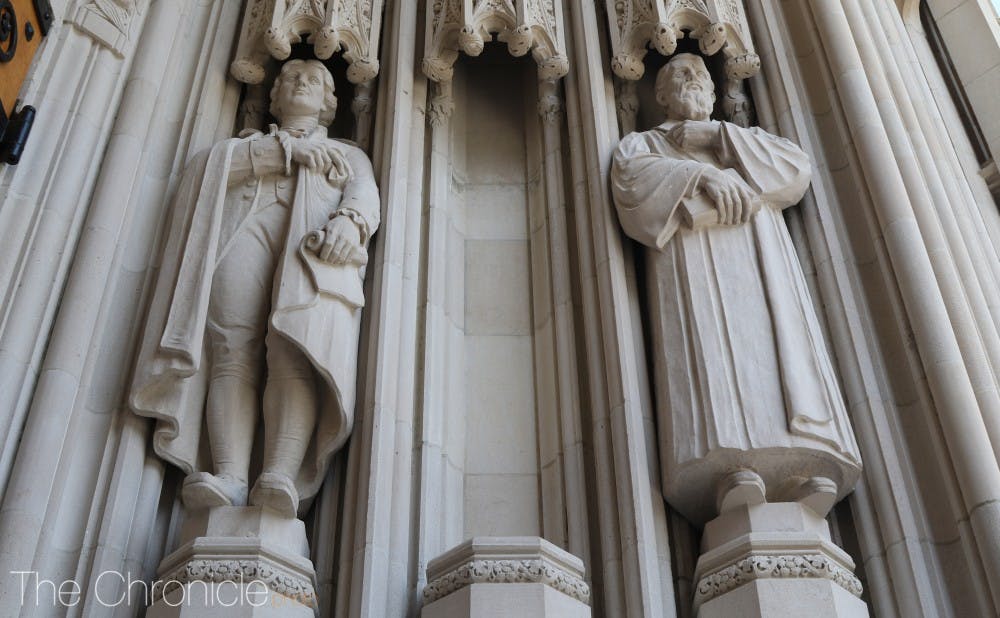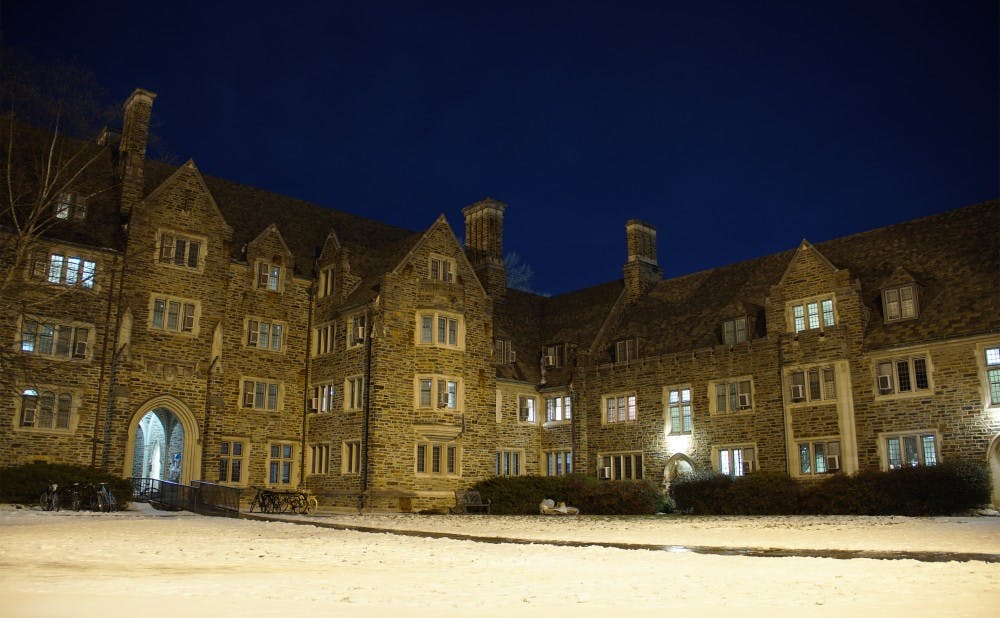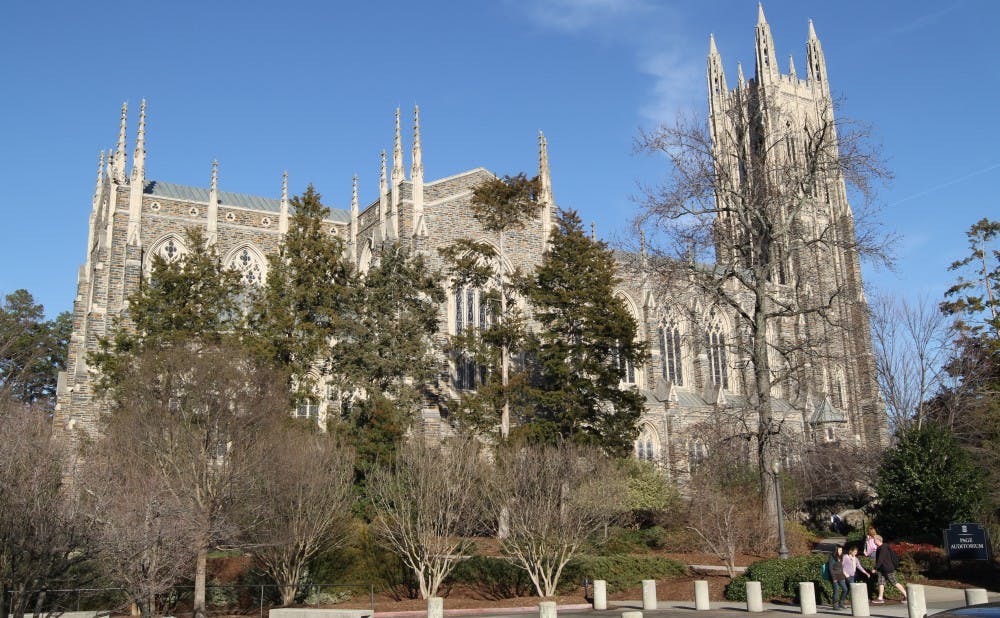A former member of a committee examining the University’s history expressed discontent this summer with the first year of the committee’s work.
After serving on the President’s Advisory Committee on Institutional History, created last summer, Gino Nuzzolillo, Trinity ‘20, wrote a public letter to Committee members and Duke’s administration with concerns about the committee’s foundation and the execution of its mission.
The letter criticized the Committee’s first year of operations, before its membership last month and President Vincent Price this month assigned the committee an updated charge. It included questions about the committee’s focus and transparency, and the lack of meetings after the COVID-19 pandemic hit. It also included Nuzzolillo’s understanding that the committee was not allowed to consider renaming buildings named after Duke donors—disputed by Michael Schoenfeld, vice president for public affairs and government relations and a member of the committee—and his recommendations for how Duke could better engage with its history.
Nuzzolillo, who graduated in May with a degree in history and certificate in human rights, focused most of his undergraduate studies and research on the American South. His interest in the South and efforts to hold Duke accountable “to its stated ideals and principles” are what fueled his interest in the ACIH, according to the letter.
“I believe that a rigorous, honest, and nuanced investigation of our institution’s history is necessary for understanding how we arrived at our present moment and how we might ask more critical questions about our future,” his letter reads.

The ACIH was designed to expand upon the work of a commission created after the Robert E. Lee statue was removed from West Campus.
An advisory committee, but on what?
When the committee was first announced, President Vincent Price said in a news release that it would “be a source of valuable guidance to [him] as questions and issues arise regarding Duke’s history that would benefit from thoughtful and engaged consideration.”
The committee was announced in June 2019 and designed to expand upon the work of the Commission on Memory in History, which was formed in 2017 after the Robert E. Lee statue on West Campus was removed by the University after being vandalized.
Price tasked the advisory committee with “reviewing the names of Duke buildings and public places to ensure that they are consistent with Duke’s principles” and “identifying buildings on the Duke campus that would benefit from public displays to highlight their histories and, in some cases, how that history has evolved over the years,” Schoenfeld wrote in an email.
Price’s charge for the 2020-21 Committee, released in September, also includes considering “naming proposals at the request of the president.”
Committee Chair L. Gregory Jones, dean of the Duke Divinity School, wrote in an email to The Chronicle that Duke’s recent decision to name the Reuben-Cooke Building in honor of one of the University’s first Black undergraduate students was in part due to the Committee’s work.
“The students, faculty, staff and alumni who served on the President’s Advisory Committee on Institutional History last academic year did very important work in a numbers of areas,” Jones wrote.
But rather than critically reviewing campus history, “it was largely about building names,” a focus that was merely a way to “avoid controversy,” Nuzzolillo said.
“It was in some ways a [public relations] stunt and a way to fulfill very specific interests on the University's end, which is to minimize as much disruption or challenges to administrative authority as possible,” he said.
Nuzzolillo said that he felt mainly considering building names was “problematic,” and that he believes it “reduces institutional history to whether or not somebody who's racist or awful is named on a building, rather than this kind of truth-telling process that I think we need to have.”
Schoenfeld wrote in an email that the committee submitted an interim report to Price in January, which discussed building names, individuals in Duke’s history who deserved to be honored on campus, the identification of buildings “that would benefit from public displays to highlight their histories and, in some cases, how that history has evolved over the years” and recommendations of “ways for members of the Duke community and visitors to engage with Duke’s history as they travel around campus.”
Nuzzolillo wrote in a message that he understood that buildings named after donors were not within the committee’s scope and instead fell under Duke’s alumni affairs and development teams. But Schoenfeld denied the characterization that the committee could not consider renaming buildings named after donors, and said that ACIH members can call into question any building name.
“Anybody can raise an issue about any individual or about any particular building, so there's no limitation on what questions can be asked,” he said.
Michael Bennett, a second-year master of public policy candidate who served on the advisory committee, wrote in an email that he doesn’t recall an “explicit policy” not to address buildings named after donors, but that they “were certainly steered away from the donor-named buildings.”
University Archivist Valerie Gillispie, who served on the committee, was not able to confirm or deny instructions to restrict the committee’s work to different buildings, writing in an email that although she could not remember any such instructions, she may have missed portions of committee meetings. Jones did not directly answer a question on whether members were allowed to discuss buildings named after donors.
Bennett said that the Committee created a “pretty exhaustive list” of names that they felt deserved greater historical recognition, proposing ideas such as scholarships named after them, plaques and other public displays.
“Lots of focus, for example, if someone was a slave owner,” he wrote. “That’s something we flagged every instance we found.”
Bennett and Nuzzolillo both cited Braxton Craven—after whom Craven Quadrangle is named, and who was a slaveholder—as a big point of discussion for the Committee. Bennett noted that “with that in our history, we focused on those figures as opposed to donors.”
Bennett told The Chronicle there were ideas thrown around to help Duke “be very upfront about engaging with what this institution was about,” such as a website and incorporating history into campus tours to help feel like “Duke isn’t hiding its history.”
Multiple other members wrote in emails that they were unavailable to comment on their experiences serving on the ACIH.

Braxton Craven, after whom Craven Quad is named, was a slaveholder.
No promises on recommendations
Bennett said that there was no guarantee that any of the ACIH’s work would go into action, noting that “the [Board of Trustees] can choose to pick up everything that we recommend or none of it.”
Jones wrote in an email to The Chronicle that Price “accepted some of the [committee’s] recommendations and continues to review the rest.”
Nuzzolillo proposed a separate list of eight recommendations for the University at the end of his letter, including rewriting the mandate of the ACIH and creating reparative policies for identities that Duke has historically harmed.
He wrote in the letter that he largely drew inspiration from the Activating History for Justice at Duke report in composing his recommendations. That report—which came out of a Bass Connections team—includes recommendations on Duke’s engagement with its history.
“All of my recommendations here are hopefully to get us closer to that idea of truth-telling, but also elevate the demands that exist now that are coming from our community members,” he told The Chronicle, noting that he hopes they help to “democratize the conversation about institutional history.”
Nuzzolillo said he feels that the Committee is missing out on “an opportunity for a far more expansive and transformative process,” one that he hopes to begin through his recommendations.
A lack of continuity
Bennett also said that the Committee wasn’t “well equipped” and that they shared ideas to increase outreach, such as a website and oral history program, that didn’t receive much support from administration.
Nuzzolillo also asserted that the ACIH wasn’t equipped for the task, noting in his letter that the Committee had no money.
Schoenfeld told The Chronicle that no committees have budgets.
“I’m not sure where that issue came from,” he said. “From the get go, no committee has a budget.”
Bennett said that he believed having more frequent meetings would have been beneficial and that the committee should have met after dispersing for the pandemic.
As Black Lives Matter protests grew, Nuzzolillo sent a message to members June 10 saying that they should meet and attempt to dissect the feelings of the moment. Bennett and others responded in agreement, but a meeting never materialized.
“Like everything at Duke, and indeed the whole country, our planned meetings in the spring and summer—including broad outreach—were disrupted by the COVID-19 pandemic and the need to focus on adjustments (in the spring) and then the reopening of campus for the summer and fall,” Jones wrote in an email. “I am very confident that under Dean Paula McClain’s leadership this year the new committee will continue to provide good advice to President Price and continue to engage with the Duke community.”
McClain, dean of the Graduate School, is chair of the committee as of last month.
Schoenfeld confirmed to The Chronicle in an email that the last in-person committee meeting of the year was held a few days before the University shut down for COVID-19. This year’s committee met for the first time Sept. 23, he wrote in an email that day.
‘This is unacceptable:’ Diversity within the Committee
Nuzzolillo also wrote that the make-up of ACIH members during his time “[did] not reflect the Duke community.”
The committee was made up of 12 members, nine of whom were white men and none of whom were hourly staff workers, the letter notes. Only two members were Black, and only three were women.
“The Committee’s makeup also reinforces a pattern which conflates whiteness and power at Duke,” the letter reads. “This is unacceptable.”
Nuzzolillo told the Chronicle that he “wanted to try to address some of the enduring inequality along the lines of race, gender, class, ability, etc. that we should be addressing when thinking about our institutional history.”
“There is no way that the committee that we assembled would then also be representative of that kind of conversation,” he said.
Jones did not directly respond to a question about the membership of the committee in its first year.
A lack of transparency
Nuzzolillo also criticized the committee for being opaque.
“The Committee’s charge does not provide for public updates or hearings, has not proactively invited members of our community to share comments at meetings, and has no mandate to publicly share the recommendations it issues to President Price,” Nuzzolillo’s letter reads.
Nuzzolillo also wrote that members of the community who are particularly affected by the work of the ACIH—including Black and Indigenous students, as well as Durham residents—had little access to the Committee’s work. That lack of access contributed to a lack of accountability for the Committee, he wrote.
Bennett said that if committee members wanted to engage with the public, they had to do so “on their own charge,” which he saw as being a shortcoming of the committee.
“Everyone on this committee had other responsibilities,” he said. “I was a student, Gino was a student and there were professors—this wasn’t our job.”
Jones did not directly comment on Nuzolillo’s claim of a lack of transparency.
Price’s 2020-21 charge for the committee, effective as of September, included “as directed by the president, [conducting] outreach to the Duke and Durham communities.” Examples include listening sessions, discussion and soliciting comments.
Price also included a charge to be a resource for the Board of Trustees Centennial Celebration and Duke and Durham strategic task forces, as well as developing a proposal for how Duke can “meaningfully commemorate its founders” each annual Founders Weekend.
The response
Nuzzolillo emailed his letter to the committee members June 29, the day before the official end of his term on the committee.
Price responded July 1, writing to Nuzzolillo that he appreciated his service but “[regretted] to learn of [Nuzzolillo’s] disappointment” with some aspects of the committee, according to a copy of the email reviewed by The Chronicle. He wrote that he would meet with Jones later in the month to discuss potential changes to the committee.
Nuzzolillo told The Chronicle that since he’s graduated, he’s needed to take a break from engaging in activism with the University.
“I wrote this letter because I thought I had a responsibility as my [ACIH] term was ending, but I need a clean break for a while,” he said. “I need to detox.”
However, despite needing time to refocus, Nuzzolillo said he believes this responsibility extends beyond the committee.
“Duke is a community that I am now a part of forever, for better or for worse,” he said. “To some extent, I have a responsibility to stay informed on what's happening and support the next generation of people who are fighting to make the University a little bit more livable and survivable.”
Editor's note: An earlier version of this article did not give Michael Bennett's first name or identifying information, and it has been updated to include them.
Get The Chronicle straight to your inbox
Signup for our weekly newsletter. Cancel at any time.

Leah Boyd is a Pratt senior and a social chair of The Chronicle's 118th volume. She was previously editor-in-chief for Volume 117.

